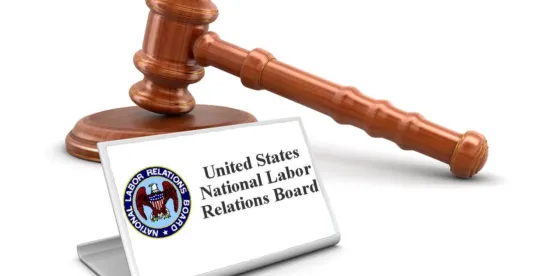As we’ve discussed previously (see here and here), next up on the NLRB chopping block is whether non-compete agreements create a “chilling effect” on employees in the exercise of their Section 7 rights of the National Labor Relations Act (“NLRA”). In May 2023, the NLRB GC espoused the view that such agreements violate the NLRA, and we now have the first decision from an Administrative Law Judge (“ALJ”) confirming the GC’s view, setting up a potential decision by the National Labor Relations Board.
On June 13, 2024, an ALJ issued a significant blow to an employer’s ability to utilize non-compete provisions in employment agreements. In J.O. Mory, Inc., No. CA-309577 (2024), the ALJ held that overly broad non-compete and non-solicitation provisions in an employment agreement may create a “chilling effect” on employees’ exercise of their Section 7 rights, and thus violate the NLRA.
Background
The Employer, a manufacturing firm, terminated an employee who was salting, a protected-union practice where a union representative gains employment at a non-union workplace with the hopes of drumming up support for organizing the employer.
Among the key allegations, the NLRB’s GC challenged core provisions in the employment agreement that limited current and former employees from competing or soliciting other employees.
As part of the employment agreement, employees agreed (1) to not directly or indirectly solicit or encourage any other employee to leave the employer for a period of 24 months, to prevent “pirating;” (2) to tell the employer of “any and all offers or solicitations of employment that “Employee may receive from third parties;” and (3) to not engage in competition with the employer for a period of 12 months post termination.
Non-Compete and Non-Solicitation Provisions Unlawful
The ALJ reviewed the contractual provisions under the policy review test set forth in Stericycle, 372 NLRB No. 113 (2023) (discussed here), and held that (1) the non-compete clause was overly broad and restrictive because it limited a former employee’s ability to work in the industry; and (2) these provisions could be used as a tool to discourage unionization by threatening retaliation from the employer and limiting future employment opportunities.
The ALJ reasoned that the challenged provisions “would deter a reasonable employee for fear of retaliation,” stating as follows:
“If an employee knows they are barred from being involved in any capacity with any company that operates a similar business to Respondent, they will logically be more fearful of being fired and less willing to rock the boat because they face the prospect of being unable to find any work in their geographic area if they are fired or forced to leave their job.”
Under Stericycle, the ALJ found this provision presumptively unlawful, and the Employer could not demonstrate that a more narrowly-tailored provision could have met any substantial business interest it had in promulgating the restriction.
Furthermore, the ALJ held that requiring an employee to report any and all solicitation attempts—without carving out an exception for union or other activities protected by Section 7 of the NLRA—further reinforced the chilling effect of the agreement.
Takeaways
The only thing surprising about this decision is that it came from an Administrative Law Judge. Despite a pendulum swing of policy review at the NLRB, non-competes have not been the subject of attack as unlawful. If this decision is appealed, it is likely the NLRB will affirm the holding. This decision adds to the recent challenges employers have faced with respect to the use of non-compete agreements, including the recent FTC vote to ban most non-compete agreements (see our discussion here).





 />i
/>i

